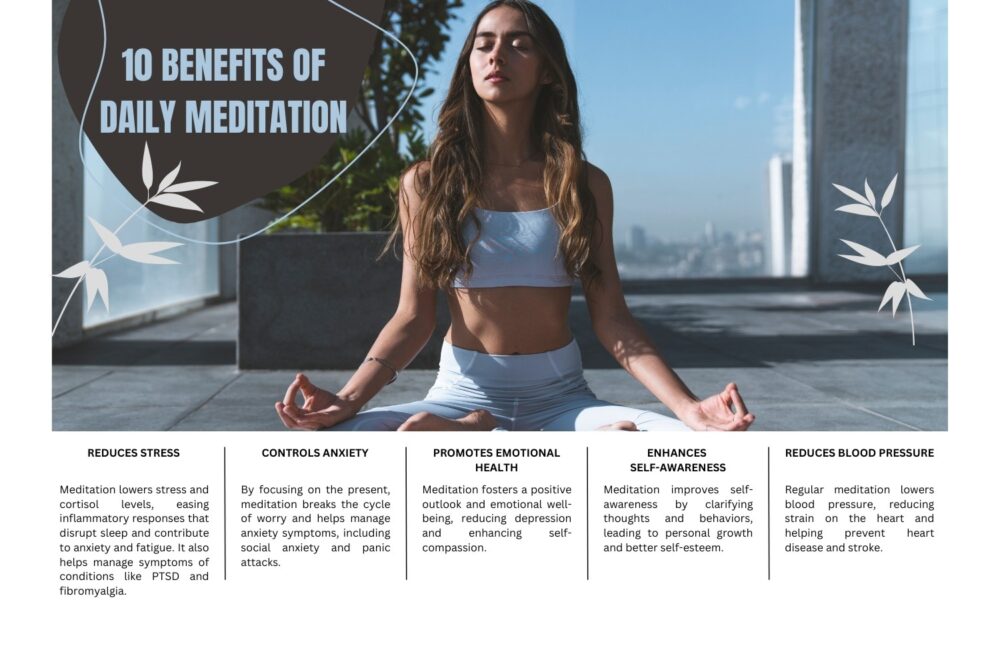In today’s world, stress and anxiety is common. People are constantly seeking ways to find mental peace, balance, and relaxation. Besides therapy and medication, meditation stands out as the most efficient and natural way to combat stress and anxiety. Meditation with origins rooted in ancient spirituality and practice has stood the test of time, gaining widespread popularity for its numerous benefits. Here are 10 benefits of daily meditation.
What is Meditation?
Meditation is a practice where an individual uses a technique – such as mindfulness, focusing the mind on a particular object, thought, or activity. Meditation trains attention and creates a mindful awareness to achieve an emotionally calm and stable state. Meditation involves techniques that encourage and develop concentration, clarity, emotional positivity, and a calm seeing of the true nature of things.
Types of Meditation
There are various types of meditation, each a specific technique with their own unique benefits. The most popular are:
- Mindfulness Meditation: Focuses on immersing oneself in the present moment, observing thoughts and feelings without judgment.
- Transcendental Meditation: Involves mantra chanting to achieve a state of restful alertness. It aims to transcend ordinary thinking and enter a state of pure consciousness.
- Guided Meditation: This involves meditative exercises often focusing on visualization and deep relaxation.
- Loving-Kindness Meditation: Also known as Metta meditation, it involves directing love and kindness towards oneself and others, fostering compassion and empathy.
- Zen Meditation: Rooted in Zen Buddhism, this form involves sitting in specific postures and focusing on breath and awareness, often under the guidance of a teacher.
Tips on How to Get Started
Starting a meditation practice can be simple and doesn’t require any special equipment. Here are some tips to help you get started:
- Find a Quiet Space: Choose a quiet place where you won’t be disturbed. This helps in minimizing distractions and creating a conducive environment for meditation.
- Set a Time: Establish a regular time for your meditation practice. Consistency is key to reaping the benefits of meditation.
- Start Small: Begin with short sessions, around 5-10 minutes, and gradually increase the duration as you become more comfortable.
- Focus on Breath: Concentrating on your breath is a simple yet effective way to begin meditation. Pay attention to the sensation of your breath as it enters and leaves your body.
- Be Patient: It’s normal for your mind to wander. When it does, gently bring your focus back to your breath or chosen focal point without judgment.
- Use Guided Meditations: Beginners may find guided meditations helpful. These provide structure and guidance, making it easier to focus and relax.
- Stay Committed: Like any skill, meditation requires practice. Stay committed to your routine, even if progress seems slow at first.
Begin your meditative journey by fortifying your body with a healthy diet, and good lifestyle habits. These induce conditions that prepare your body for an enhanced meditative experience.
10 Benefits of Daily Meditation
Studies have shown that meditation has several benefits. It can improve sleep quality, reduce stress and many more for overall mental health.
1. Reduces Stress
Stress reduction is a common reason people try meditation. A review confirmed that meditation effectively reduces stress and cortisol, the stress hormone. Cortisol increases inflammatory cytokines, which disrupt sleep, promote depression and anxiety, raise blood pressure, and cause fatigue and cloudy thinking. An 8-week study showed that “mindfulness meditation” reduces this inflammatory response. Additionally, meditation can improve symptoms of conditions like irritable bowel syndrome, PTSD, and fibromyalgia.
2. Controls Anxiety
Meditation helps break the cycle of worry and rumination that often accompanies anxiety by bringing our attention to the present moment. It allows you to observe your thoughts and emotions non-judgmentally, creating space between you and your anxiety. Regular practice helps in managing symptoms of anxiety disorders, including social anxiety, phobias, and panic attacks. Additionally, a study found that 8 weeks of mindfulness meditation reduced anxiety symptoms in people with generalized anxiety disorder. It also increased positive self-statements and improved stress reactivity and coping
3. Promotes Emotional Health
Meditation fosters a positive outlook and enhances emotional health. It helps in reducing symptoms of depression and promotes a sense of well-being by encouraging mindfulness and self-compassion.
4. Enhances Self-Awareness
Meditation increases self-awareness by helping individuals understand their thoughts and behavior patterns. This awareness can lead to personal growth and self-improvement by improving self-esteem, confidence, and self-image.
5. Reduces Blood Pressure
Meditation reduces blood pressure both during sessions and over time in regular practitioners. This decrease can alleviate strain on the heart and blood vessels, helping to prevent heart disease and stroke. Besides this, meditation can reduce symptoms of conditions like Alzheimer’s, slow down cellular aging and might help manage diabetes.
6. Boosts Attention Span
Meditation trains the mind and enhances cognitive efficiency and performance. Regular meditation practice improves focus and attention. It trains the mind to stay on task, reducing distractions and enhancing cognitive performance.
7. Improves Sleep
Meditation helps in improving sleep quality by relaxing the mind and reducing the factors that cause insomnia. It fosters a sense of calm and relaxation, which is essential for a good night’s sleep.
8. May Help with Memory Loss as You Age
Meditation has been shown to improve attention and clarity of thinking, which helps keep the mind young. It also helps in preventing age-related memory loss by enhancing cognitive function.
9. Helps Control Pain
Meditation can alter the perception of pain by changing the way the brain processes pain signals. It is particularly beneficial for chronic pain sufferers, providing relief without medication.
10 Generates Kindness and Compassion
Loving-kindness meditation specifically increases positive feelings and actions towards oneself and others. Moreover, meditation’s impact on inducing calmness leads to a more positive mindset making people kinder and compassionate. It promotes altruistic behavior.
Conclusion
Meditation offers a myriad of benefits that enhance both mental and physical health. From reducing stress and anxiety to improving sleep and cognitive function, the advantages of incorporating meditation into your daily routine are vast. By understanding what meditation is, exploring the different types, and following simple tips to get started, you’ll discover a path to inner peace, clarity, and a more balanced life.















